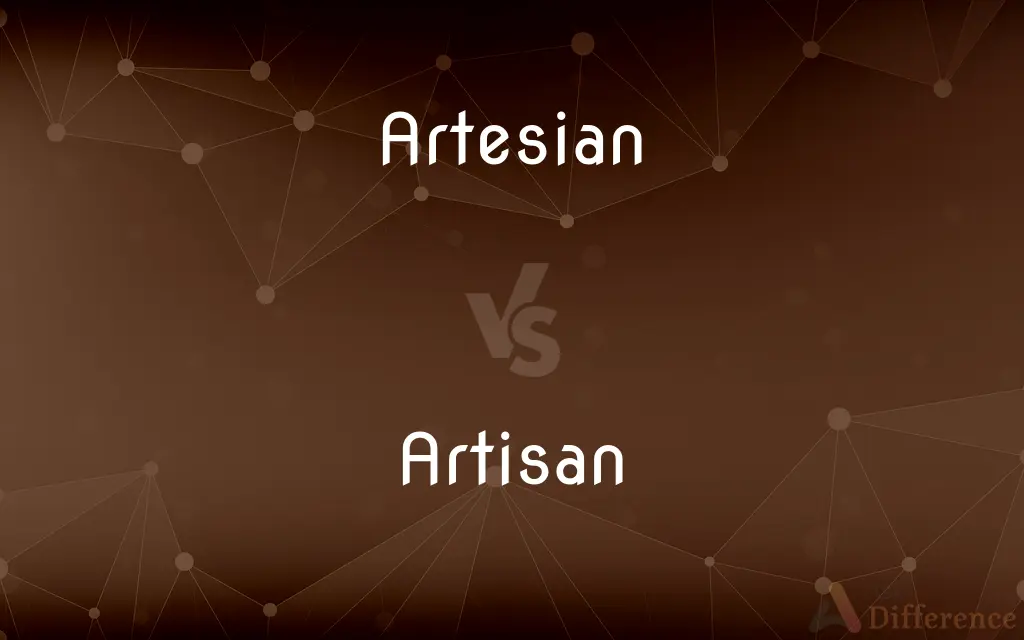Artesian vs. Artisan — What's the Difference?
By Maham Liaqat & Fiza Rafique — Updated on March 8, 2024
Artesian wells are underground water sources under pressure, facilitating upward flow without pumps, while artisans are skilled manual workers or craftspeople.

Difference Between Artesian and Artisan
Table of Contents
ADVERTISEMENT
Key Differences
Artesian wells are natural underground formations where water is confined under pressure, allowing it to rise to the surface without mechanical aid. This phenomenon occurs in permeable rock layers encapsulated by impermeable layers, enabling water to be drawn from significant depths. Whereas artisans are individuals proficient in trades or crafts that require manual skill or artistry, often producing unique, functional, or decorative items by hand or with minimal mechanization.
Artesians exploit geological and hydrological principles to access water, depending on the earth's layers and water table conditions for their functioning. The term originates from the former province of Artois, France, where such wells were first drilled in the 12th century. On the other hand, artisans embody cultural, artistic, and historical craftsmanship, with their skills often passed down through generations, reflecting traditions, innovation, and the personal touch in their work.
While artesian wells contribute to agriculture, drinking water supplies, and sometimes geothermal energy, their value is in resource provision and environmental sustainability. Artisans, however, contribute to the economy through the creation of goods, preservation of heritage, and by offering alternatives to mass-produced products, enriching communities with their artistry and creativity.
Artesian wells and artisans highlight the intersection of natural resources and human skill. The former leverages the natural environment for essential resources, whereas the latter showcases human ingenuity and creativity in manipulating materials for aesthetic and practical purposes.
Comparison Chart
Definition
A well tapping a confined aquifer
A skilled craftsperson
ADVERTISEMENT
Origin
Natural geological formation
Human skill and creativity
Purpose
Water supply
Creation of unique or custom items
Key Characteristic
Pressure-driven water flow
Manual skill or craftsmanship
Examples
Drinking water wells, irrigation wells
Carpentry, pottery, glassblowing, metalwork
Compare with Definitions
Artesian
A well that taps into a confined aquifer causing water to rise above the aquifer without pumping.
The artesian well in the village provides clean water year-round.
Artisan
High level of craftsmanship and creativity.
The artisan's skill is evident in the intricate details of the jewelry.
Artesian
Draws water from deep within the earth, filtered through layers of rock.
The clear water from the artesian well is naturally filtered through underground rock formations.
Artisan
Contributes to the local economy and culture.
Local artisans help preserve traditional crafts and contribute to the economy.
Artesian
Effective in areas with suitable geological conditions.
The artesian well thrives in areas where impermeable rock layers trap water under pressure.
Artisan
A worker skilled in a trade, especially one that involves making things by hand.
The artisan crafted a beautiful vase from clay.
Artesian
Can be a sustainable water source if managed properly.
Proper management ensures the artesian well continues to supply water sustainably.
Artisan
Often produces bespoke or custom items.
The artisan makes custom furniture pieces on request.
Artesian
Water rises due to natural pressure in the aquifer.
The pressure in the aquifer forces the water up the artesian well without the need for a pump.
Artisan
One trained to manual dexterity in some mechanic art or trade; and handicraftsman; a mechanic.
This is willingly submitted to by the artisan, who can . . . compensate his additional toil and fatigue.
Artesian
(of a water supply) Rising to the surface under its own hydrostatic pressure.
Artisan
May involve traditional techniques passed down through generations.
The artisan uses techniques learned from his ancestors.
Artesian
Of or pertaining to Artois (anciently called Artesium), in France.
Artisan
An artisan (from French: artisan, Italian: artigiano) is a skilled craft worker who makes or creates material objects partly or entirely by hand. These objects may be functional or strictly decorative, for example furniture, decorative art, sculpture, clothing, food items, household items and tools and mechanisms such as the handmade clockwork movement of a watchmaker.
Artesian
(of water) rising to the surface under internal hydrostatic pressure;
An artesian well
Artesian pressure
Artisan
A person skilled in making a product by hand.
Artisan
Made by hand or by traditional means and using high-quality ingredients; artisanal
Artisan cheeses.
Artisan wine.
Artisan
A skilled manual worker who uses tools and machinery in a particular craft.
Artisan
A person who displays great dexterity.
Artisan
Artisanal
Artisan
One who professes and practices some liberal art; an artist.
Artisan
A skilled worker who practices some trade or handicraft
Common Curiosities
What is an artisan?
An artisan is a skilled craftsperson who creates products by hand, showcasing high levels of craftsmanship and creativity.
How does an artesian well work?
An artesian well works by tapping into a confined aquifer where water is under pressure, allowing it to flow to the surface naturally.
How do artesian wells and artisan products differ?
Artesian wells are natural water sources driven by geological pressure, while artisan products result from skilled craftsmanship and creativity.
Why are artesian wells important?
Artesian wells are important for providing sustainable and clean water sources in areas where surface water may be scarce or contaminated.
How do artisans contribute to the economy?
Artisans contribute to the economy by creating jobs, preserving cultural heritage, and offering unique products that are often in demand for their quality and craftsmanship.
What is an artesian well?
An artesian well is a well that taps into a confined aquifer, allowing water to rise to the surface naturally due to pressure without the need for pumping.
Are artesian wells sustainable?
Artesian wells can be sustainable if they are properly managed to prevent over-extraction and depletion of the aquifer.
Can anyone become an artisan?
Becoming an artisan typically requires years of practice and dedication to develop the necessary skills and craftsmanship in a specific trade or craft.
Is there a difference between an artisan and a craftsman?
While the terms are often used interchangeably, some distinguish a craftsman as focusing more on the technical skill and an artisan on the creative aspect of the craft.
Can artesian water be used for anything besides drinking?
Yes, artesian water can also be used for irrigation, industrial processes, and sometimes geothermal energy, depending on its quality and temperature.
What makes artisan products special?
Artisan products are special due to their unique, handcrafted nature, often reflecting traditional techniques and personal creativity.
What is required to maintain an artesian well?
Maintaining an artesian well requires regular monitoring to ensure the aquifer's health, preventing contamination, and managing the extraction rate to sustain water levels.
What challenges do artisans face?
Artisans often face challenges such as competition from mass-produced goods, securing markets for their products, and the need for materials and tools.
How do artisans preserve traditional crafts?
Artisans preserve traditional crafts by utilizing age-old techniques, often passed down through generations, and keeping cultural heritage alive through their work.
How can one support local artisans?
Supporting local artisans can be done by purchasing their products, promoting their work, and participating in local craft fairs or markets.
Share Your Discovery

Previous Comparison
Complex vs. Complexed
Next Comparison
Rebuttal vs. SurrebuttalAuthor Spotlight
Written by
Maham LiaqatCo-written by
Fiza RafiqueFiza Rafique is a skilled content writer at AskDifference.com, where she meticulously refines and enhances written pieces. Drawing from her vast editorial expertise, Fiza ensures clarity, accuracy, and precision in every article. Passionate about language, she continually seeks to elevate the quality of content for readers worldwide.















































